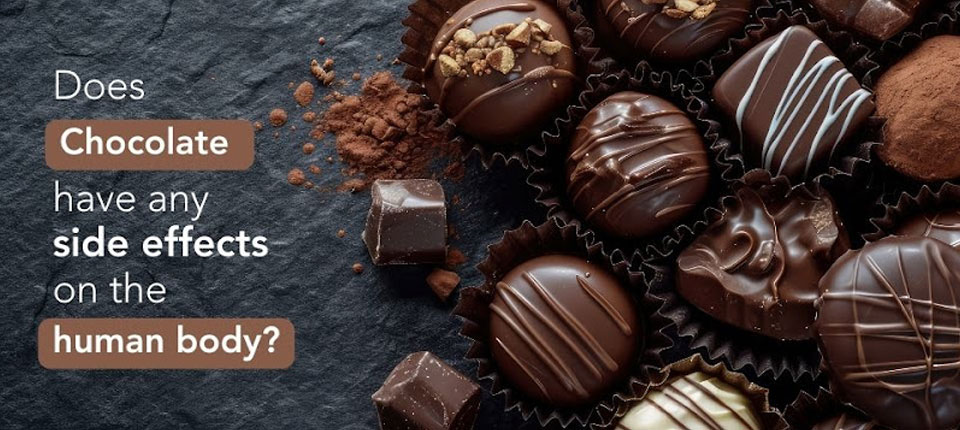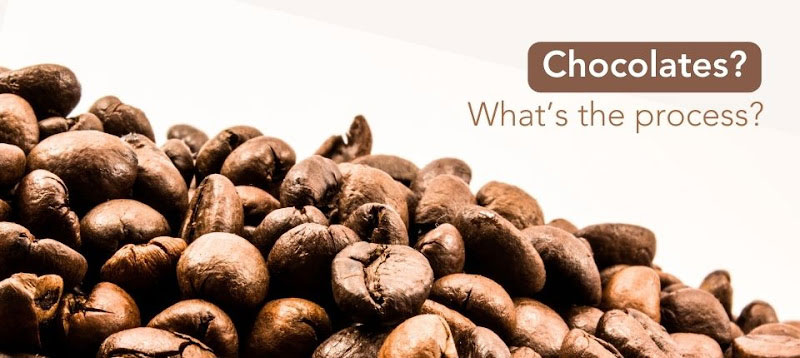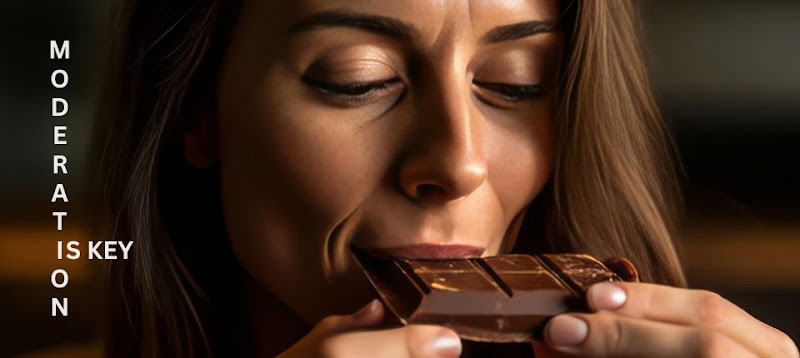
Analyzing the effects of chocolate on human health
Dark Chocolate:
You can call these the elder chocolate because it dates back to the ancient Mesoamerican civilizations. It has an intense flavour with a bittersweet taste with a high cocoa content, between 50% to 100%. It has a high high antioxidant content and lower sugar content.

Milk Chocolate:
Slightly younger, developed in the 19th century in Switzerland, it has a creamy texture and a sweeter taste with a mild cocoa flavour. It combines cocoa solids, cocoa butter, sugar, and milk powder or condensed milk. It’s eaten more often than dark chocolate however it also has a higher sugar content.

White Chocolate:
Without any cocoa solids, it’s made using cocoa butter, sugar, and milk solids. It has a smooth, creamy texture and a sweet, buttery flavour with hints of vanilla. Its ivory hue and rich consistency make it a versatile ingredient however it has the highest sugar content of all three kinds of chocolates.

What is the process of making chocolate?
According to “The Science of Chocolate" by S.T. Beckett and "Chocolate Science and Technology, The process begins with cacao bean fermentation and drying, which leads to microbial activity and polyphenol variations that give it its well-known flavour. Further processes including roasting, cracking, and winnowing, cacao nibs are extracted and then ground into cocoa mass.
After further refining processes, blending takes place using sugar, milk solids, and other ingredients. Tempering next ensures stable cocoa butter crystallisation, crucial for the desired texture and appearance.
That doesn't seem too dangerous to health now, does it?
In fact, chocolate, particularly dark chocolate does have a few health benefits!
So if chocolate is good for health why are nutritionists across the world warning against consuming too much of it?

While chocolate does have certain health benefits, they’re mostly limited to dark chocolate, and that too when eaten in moderation. Let’s break down the effects of dark chocolate on human health:
Regular and excess consumption of chocolate can lead to obesity and accumulated fats and this increases significantly if the chocolate being consumed is milk or white.
The high sugar content in chocolate poses a risk to dental health resulting in decay, toothaches, and in worst cases complete teeth removals.
Chocolate consumption, attributed to its high sugar content, may increase hyperactivity. While this does not cause cognitive issues, it can lead to what is commonly known as a sugar rush.
Food allergens can be modified by food processing or through specific methods of cooking and the result is a protein that is less or more allergic than the native protein. As such, certain allergens present in chocolate can trigger allergic reactions in susceptible individuals.
Chocolate, containing compounds like phenylethylamine and tyramine, has been implicated in scientific studies in triggering migraines in susceptible individuals.
The caffeine and theobromine content in chocolate can relax the lower esophageal sphincter, leading to acid reflux and exacerbating symptoms of gastroesophageal reflux disease (GERD).
Chocolate consumption has been linked to exacerbating symptoms of irritable bowel syndrome (IBS) as well as issues with lactose intolerant individuals.
The caffeine content in chocolate can disrupt sleep patterns and exacerbate insomnia, particularly when consumed in the evening or close to bedtime making it a difficult product to eat for individuals prone to sleep disturbances.
Chocolate consumption has been associated with increased esophageal acid exposure and a heightened risk of heartburn making it difficult for individuals with acid reflux issues to consume.
While chocolate is loved by all, it can pose various risks to health. Despite its potential dangers, chocolate also offers a range of health benefits, particularly dark chocolate with its antioxidant properties.

However, moderation is key, as excessive consumption, especially of varieties high in sugar and fats like milk and white chocolate, can lead to adverse effects such as obesity and dental issues.
Furthermore, recent incidents, such as the tragic death of a child due to expired chocolate consumption, highlight the importance of food safety and awareness of expiration dates.
Additionally, concerns regarding heavy metal contamination in chocolate products raise questions about their production processes and sourcing of ingredients.
Therefore, while enjoying chocolate in moderation can be a delightful experience, it's crucial to be mindful of potential risks and to prioritize safety and informed consumption.
Remember, make an informed choice.
Not an indulgent one.